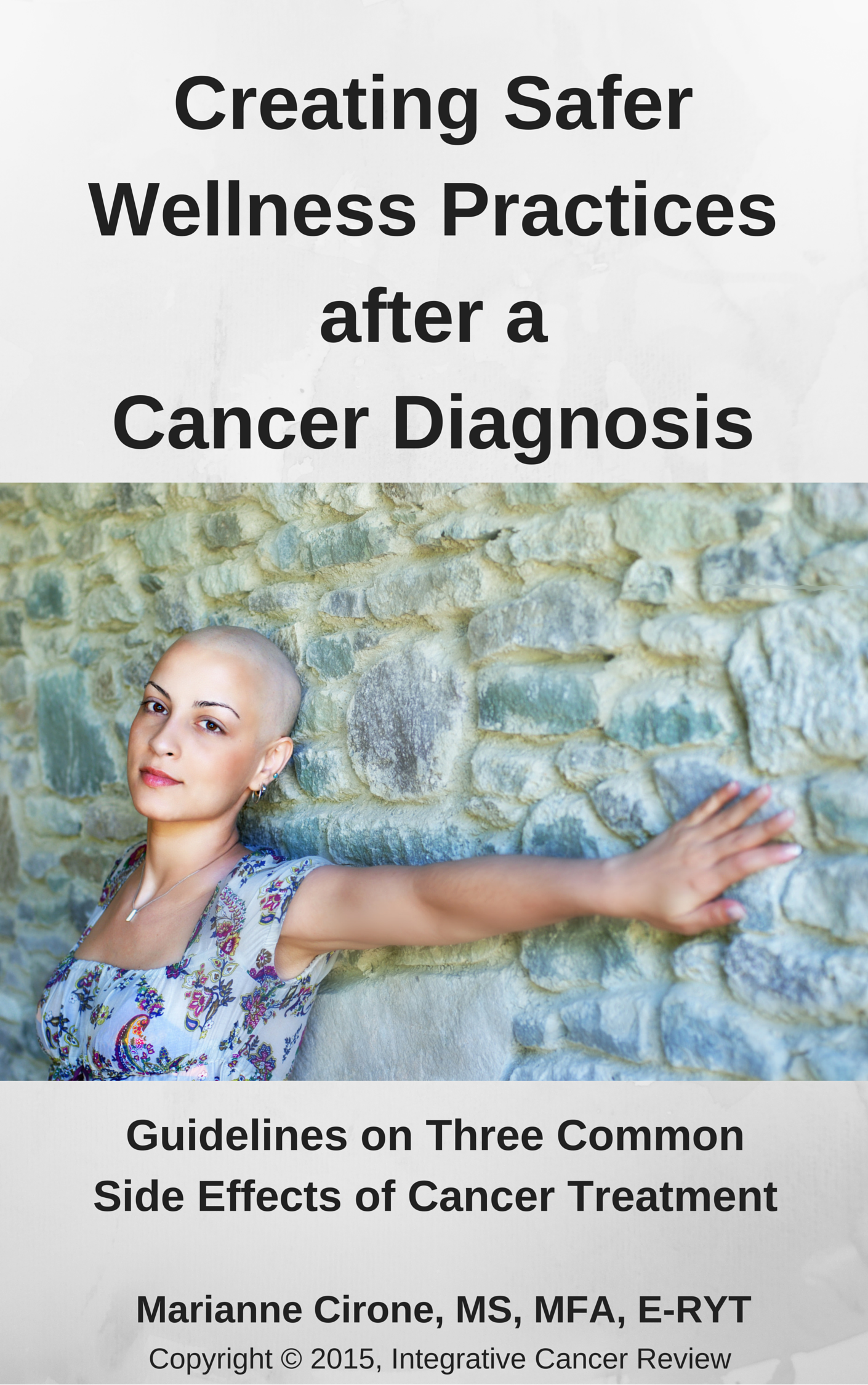
Yoga for Cancer Care
“When I do yoga, I sleep better and my mind is calmer. It’s taught me to accept each day and to breathe.”
— Kim, age 42, lymphoma survivor
Yoga and meditation are both ancient practices rooted in spiritual traditions, but recently, both modalities have come to the forefront as important tools to help in dealing with various health issues, including a cancer diagnosis. About 5,000 years ago, yoga developed primarily as a spiritual path, while its sister science, Ayurveda, developed as a system of support for health.
However, in recent years, medical science has validated many benefits of therapeutic yoga for improving and supporting health. Medical journals now regularly publish studies showing yoga as improving quality of life and aspects of health. For example, the Journal of Clinical Oncology, a preeminent publication in cancer care, published the positive findings of three major studies on yoga in the last two years. Other medical journals have published countless studies showing the benefits of yoga and meditation on health-related conditions, confirming the validity of the practices to support health and well-being.
What is Yoga?
Although we may know yoga today mainly by the physical postures called asanas, yoga is actually an umbrella term for a vast set of practices and philosophies. The broader definition of yoga includes paths of devotion, study and service, as well as Hatha Yoga, which consists primarily of the physical postures and practices that we are most familiar with in the West.
In Sanskrit, “ha” means sun, “tha” means moon, and yoga means “to unite,” so one meaning of Hatha Yoga is to unite mind, body and spirit. Hatha yoga is part of Raja or “royal” yoga, an eight-limbed system whose ultimate goal is Samadhi, the highest stage of meditation or union with the Divine. Meditation is a tool or practice in this system.
Yoga is a considered to be a science, as the consistent application of its practices will lead to a given outcome and is not based on faith. People of all belief systems can practice yoga. Practiced in a balanced manner, yoga postures and the breathing and meditative techniques have a great capacity to bring the mind, body and spirit into a state of equilibrium. One way it can do this is by calming the sympathetic nervous system (the “gas pedal”) and improving the functioning of the parasympathetic nervous system (the “brake pedal”). Just this one shift in the nervous system can impact countless physiological processes in a positive way.
What are the Benefits of Yoga for People with Cancer?
Can yoga cure cancer? Can it provide a greater quality of life, during or after cancer treatment–or even extend life? Questions like these are at the heart of the proliferation of studies on yoga for people diagnosed with cancer. So far, studies show that yoga can support quality of life for people diagnosed with cancer, especially as related to the many side effects of cancer treatment. Yoga is only one of many integrative cancer care therapies at the forefront of research, but studies on yoga in the recent past have suggested positive results that may influence the future of cancer treatment protocols as physicians and patients look for more comprehensive healing practices.
Studies show many benefits of yoga to individuals dealing with cancer, including:
- Less fatigue
- Better sleep
- Improved quality of life
- Increased range of motion
- Less pain
- Less anxiety, depression and cancer-related distress
- Normalized cortisol rhythms
The Relaxation Response
Physicians, such as Andrew Weil, M.D., founder of the Integrative Medicine Program at the University of Arizona, and mind-body medicine pioneer Herbert Benson, M.D., author of the classic health books, The Relaxation Response and Timeless Healing, were early proponents of quieting the autonomic nervous system in order to elicit a healing response from the body. The autonomic nervous system consists of the sympathetic nervous system and the parasympathetic nervous system. The “relaxation response” is a shift from activity of the sympathetic nervous system—a “fight or flight response”–to the dominance of the parasympathetic nervous system. This allows the body to go from a mode of defense to a mode of healing. In the relaxation response, there is a decrease in metabolic activity, blood pressure, heart and breathing rate, blood flow to the limbs (diverted from organs), muscle tension and a slowing of brain wave activity.
As we have become a society which, for the most part, lives on stress, our gas pedals can get stuck “on,” with the “brake pedals” having little ability to engage when needed. As a result, we live in a state of overstimulation. The chemicals produced when we are in this state of sympathetic dominance can help our bodies to respond to an extreme emergency, but can be damaging if they are constantly being produced. Yoga and meditation are two tools that science shows have the ability to create this shift in the nervous system.
Major Studies Support Yoga for Cancer
In 2013 and 2014, three major studies, all published in the Journal of Clinical Oncology (JCO), highlighted yoga’s benefits for cancer patients. The fact that three major yoga-related studies appeared in the JCO so close together may influence the recommendations that oncologists make in terms of complementary therapies. In addition, these three studies focused on issues that physicians often consider especially troublesome and difficult to address—including sleep and fatigue, as well as the highly significant cortisol patterns.
Among these studies was the recipient of the largest ever grant from the National Cancer Institute, a $4.5 million study at MD Anderson Cancer Center in Houston involving 600 women with breast cancer undergoing radiation therapy. Besides showing improvements in physical functioning and general health, the yoga group also showed improvements in the diurnal cortisol slope. Cortisol is a stress hormone, and the diurnal cortisol slope is a daily hormonal marker that, when abnormal, is associated with worse outcomes in cancer patients. The cortisol link may be the link that finally ties yoga to not only quality of life for cancer survivors, but also to length of life, as previous studies have tied abnormal (“blunted” or “flattened”) cortisol slopes to higher mortality in cancer patients.
Another major study published in JCO in 2014 was “Yoga’s Impact on Inflammation, Mood and Fatigue” led by Dr. Janice Kiecolt-Glaser of the Ohio State Institute for Behavioral Medicine Research. This study showed yoga’s positive impact on sleep quality in cancer survivors, with the yoga group showing 41% less fatigue, higher vitality, and a decrease in pro-inflammatory substances associated with a number of negative health outcomes.
In the third major JCO study on cancer and yoga, led by Karen Mustian, PhD, MPH, of the University of Rochester Medical Center, subjects who practiced a yoga program called Yoga for Cancer Survivors (YOCAS), showed improvements in sleep quality, sleep efficiency, waking patterns, as well as reduced use of medication and daytime sleepiness. YOCAS is a form of yoga which blends gentle hatha yoga with restorative yoga.
In addition to these major studies related to yoga and cancer, there have been an array of studies on the benefits of yoga and its related practices. However, the studies have employed myriad techniques under the umbrella of “yoga.” Because yoga styles and techniques can differ so vastly, experts are now calling for “dismantling trials,” in which more examination is given to one specific technique to identify its effectiveness.
Often, each proponent of a given style of yoga asserts his or her style is the best for a specific purpose, yet we need more research that directly compares styles and specific practices in order to back up those claims. However, there is a synergy that comes with the practices that cannot be easily quantified, and here is where the art of dealing with the sciences of yoga and research must come together for the future of integrative cancer care.
See more on Yoga & Meditation:
- Boost Immunity with Ayurveda
- Yoga Therapy as a Whole-Person Approach to Health
- Using Mudras in Cancer Recovery
- Cancer and Cortisol Rhythms: A Key to Health?
- Healing Yoga Retreats after Cancer Treatment with Certified Yoga Therapist, Lee Majewski
- 2017 Breast Cancer Rehabilitation and Wellness Summit – FREE Access to 45 International Expert Speakers
- Kelly Turner, PhD on Cancer, Ayurveda, Personalized Medicine and Radical Remission
- Yoga Therapy Retreats Empower Patients after a Cancer Diagnosis, with Yoga Therapist and Cancer Survivor, Lee Majewski
- Healing Yoga Retreats after a Cancer Diagnosis: Part II with Lee Majewski, Yoga Therapist and Cancer Survivor
- Breathwalk®: Meditation and Movement Bring Healing to Mind and Body
- Q&A with Rita Meier on Yoga for the Pelvic Floor
- Integrative Cancer Therapies: The Burgeoning Research on Yoga and Cancer
- Yoga Nidra: The Practice of ‘Yogic Sleep’
- The Elements of Yoga Nidra

















